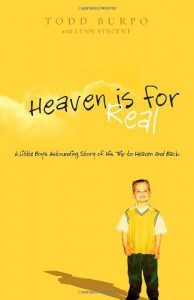 The popularity of Colton Burpo’s story, called Heaven is For Real,, about experiencing heaven while undergoing surgery raises very mixed feelings for me. On its own, it’s a nice story. It presents a hopeful outlook of what happens to us after death, and there’s little in the short tome to get worked up about.
The popularity of Colton Burpo’s story, called Heaven is For Real,, about experiencing heaven while undergoing surgery raises very mixed feelings for me. On its own, it’s a nice story. It presents a hopeful outlook of what happens to us after death, and there’s little in the short tome to get worked up about.
But it’s a story. It’s an account retold by a pastor’s son while under heavy anesthesia, offering imagery of the afterlife that props up nearly every stereotypical description of heaven, from the clouds and halos to angels with wings. Though it hardly resonates with my understanding of heaven, I don’t have a problem with folks embracing such an idea of what heaven is for them.
Pastors who have co-opted otherwise benign stories to buttress their “turn or burn” rhetoric from the pulpit? That’s another story.
What’s fascinating to me, though, is that an increasing number of westerners – Christians in particular – are rethinking heaven and the whole concept of life after death. It’s even stirring within evangelical camps, as described in a recent TIME Magazine cover story, “Rethinking Heaven.” In it, author Jon Meacham offers what moderate-conservative Anglican Bishop N. T. Wright says about heaven in his work. From Meacham’s article:
What if Christianity is not about enduring this sinful, fallen world in search of a reward of eternal rest? What if the authors of the New Testament were actually talking about a bodily resurrection in which God brings together the heavens and the earth in a wholly new, wholly redeemed creation?
I read Meacham’s interpretation of Wright with ambivalence: a feeling I’m quite familiar with in encountering Wright. He’s a brilliant mind and one of my favorite New Testament scholars from a more conservative view. And the proposition of challenging the millennial notion of “enduring this sinful, fallen world in search of a reward of eternal rest” rings true in my own heart. But the Wrights hangs on that challenge the caveats of bodily resurrection and God taking action to reconcile heaven and earth into a single creation.
You had me, N.T., and then you lost me.
Interestingly, Meacham (who describes himself as a poor Christian in the article) offers his own narrative on the subject with which I found much more traction:
Heaven thus becomes, for now, the reality one creates in the service of the poor, the sick, the enslaved, the oppressed. It is
not paradise in the sky but acts of selflessness and love that bring God’s sacred space and grace to a broken world suffused with tragedy until, in theological terms, the unknown hour when the world we struggle to piece together is made whole again. We could do worse than think in such terms.
Yes!
First, a word of affirmation for this perceived shift in evangelical thinking about heaven, despite my own issues with it. For one, a theology that binds the welfare of our present, physical world with the Kingdom of God for which they ultimately long creates natural common ground for folks to work and dialogue together who have found it difficult to do so in the past. Environmental stewardship, social justice for the oppressed and setting the wrongs of this world right trump the fetish-like millennial obsession with end-times, being victorious over the wicked and assuming there’s little reason to prolong the planet’s existence. This is something most of us can agree on, including not only Christians of all stripes, but those from other religions as well or even humanists who share the common values of compassion and environmental sensitivity.
But my issue with Wright’s version of heaven is that it still waits for God to “do something.” It presumes the existence of some anthropomorphic “Other,” who is waiting for us to pass muster, so that heaven and earth can be reconciled to one another. It seems to me that, though Wright criticizes “wait for God’s reward” theology, he replaces it with a disappointingly similar “work for God’s reward” way of thinking.
But what if there is no “other?” What if there is no greater will disassociated from humankind that waits in observation of our stumbling, fumbling attempts to put the puzzle we’ve broken back together?
What if heaven really is what we make it?
If one understands God more like the potential energy at the source of the Big Bang, or the transcendence of Love that gives life meaning, or the pull within us that guides our determination of right and wrong, then there is no need for an Other to sweep in and save us. Salvation, then, takes on a progressive, historical trajectory, toward which we strive but perhaps never reach in life. And heaven, rather than being an “adding to” or “replacing of” becomes more of a process of subtraction.
Talk about a hard sell in a consumer culture! But consider this: We can feel quite differently about the very same situation, depending on our experience, values or understanding. I think of the scene in the TV show, LOST, when Bernard is hell-bent on getting off the godforsaken island, which has become his prison. However, when his wife, Rose, reveals to him that she has a terminal disease which only the island can prevent from progressing, the thing that was his hell at once becomes his salvation.
Maybe it’s not about a better time or place. Maybe it’s not about being rescued. Maybe it’s more about making peace with what is. Maybe it’s about a collective orientation, rather than a change of scenery. Maybe it can’t fully be realized during this life, but perhaps we can achieve faint glimpses of if by striving to make peace with all that binds us, and by helping others do likewise.
Maybe we’re imperfect portraits of the God we long for. Maybe heaven already is, while also not yet being fully realized. It would help explain why Jesus could endure what, at the time, may have felt life both a failed ministry, and senseless suffering and death. When the full reality of heaven – perfect, unencumbered existence – is grasped (for most of us upon death; for Christ, perhaps sooner) all else falls into proper perspective.
And we are free.















